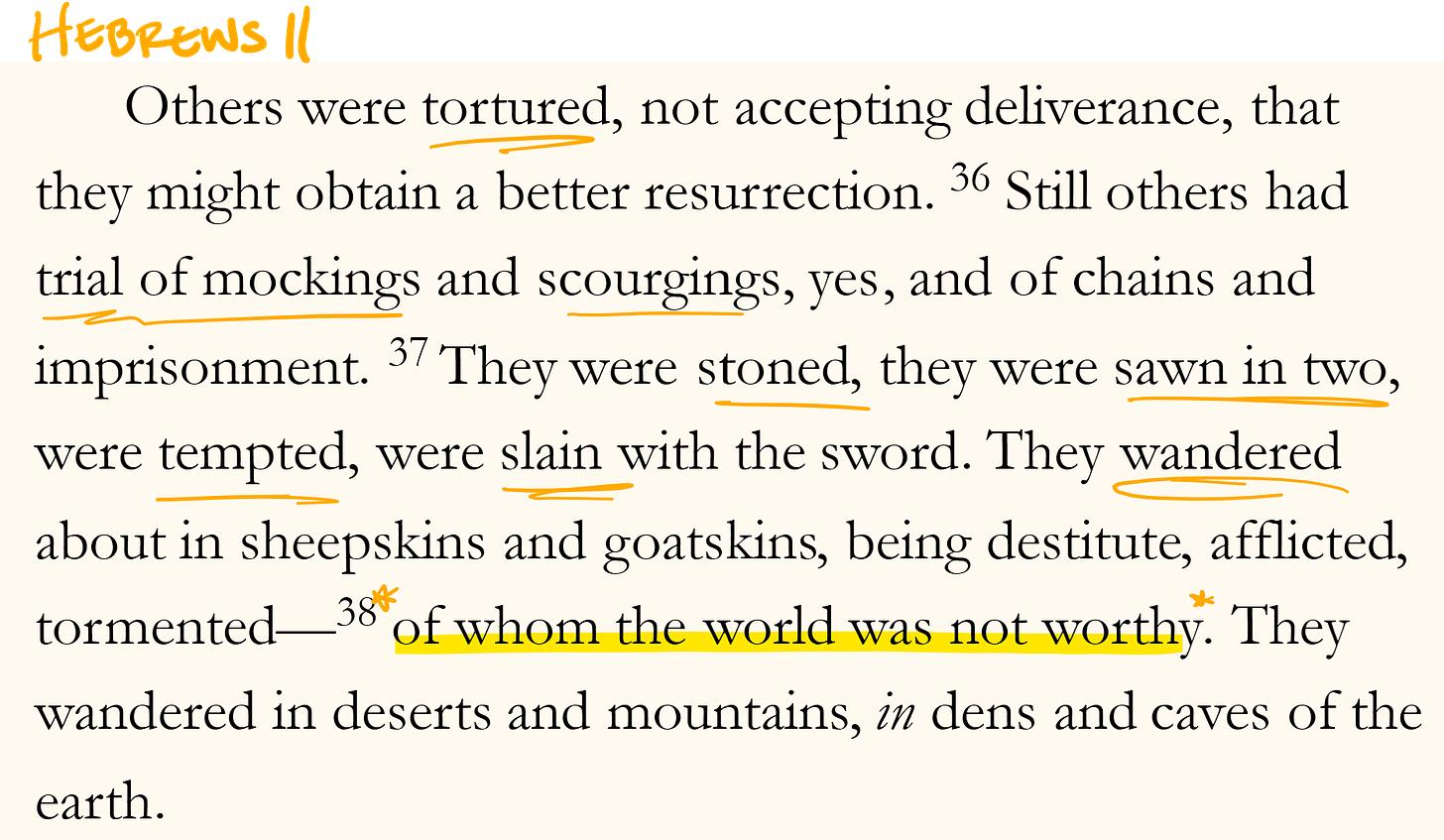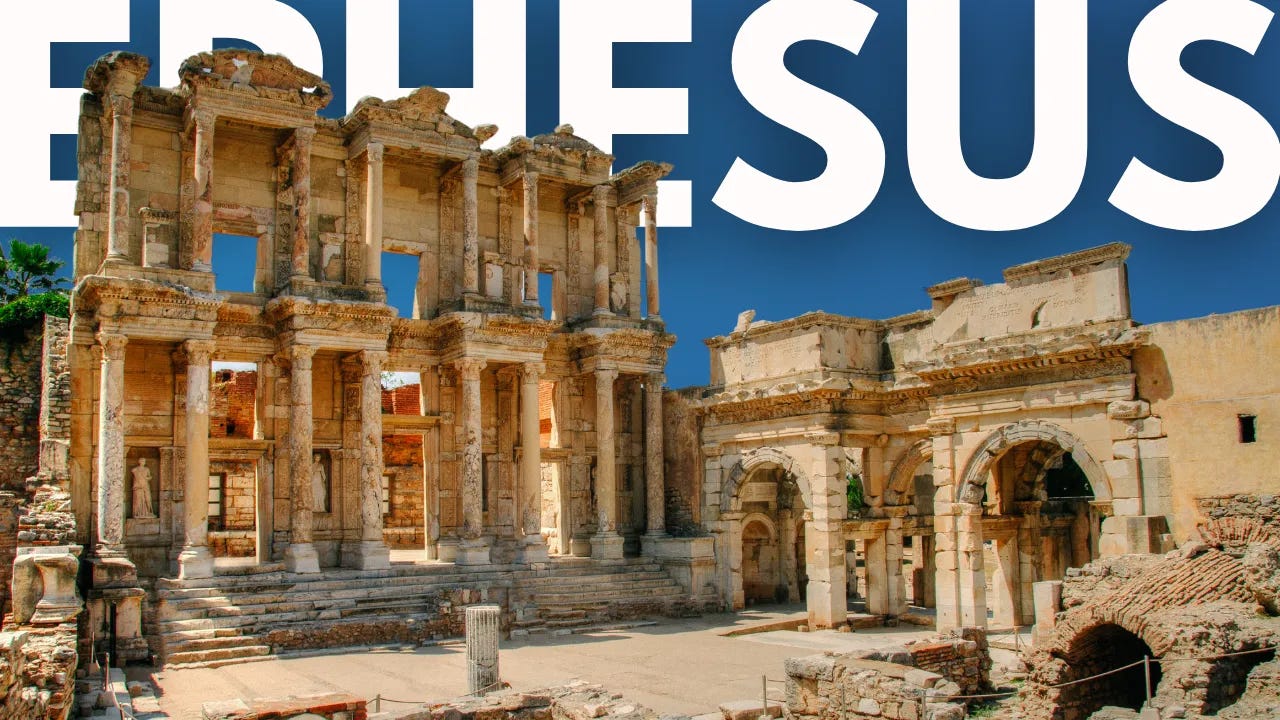Wednesday What-Not is a free newsletter. Your subscription is a helpful donation. Thanks!
1/ World Unworthy
2/ Old Testament Commentaries
Here is a collection of hundreds of old commentaries on the Old Testament: http://www.classicchristianlibrary.com/ot_section.html. This is an incredible collection.
I found it looking for an online edition of Wordsworth’s Old Testament commentaries (which you will find on the list).
3/ The Freedom of Faith, which is the Freedom of Grace
I’m writing a little book on the Parable of the Prodigal Son. I think it will be called Three Slaveries, Three Freedoms. Here are a few paragraphs I wrote this morning, which I thought you all might enjoy.
The Freedom of Faith, which is the Freedom of Grace
Imagine the prodigal son arriving back at his father’s farm, standing there at the gate. The last time he was here he couldn’t wait to leave; he never looked back to see the father standing there, watching, praying for his son’s return. He was a belly-slave then, full of lust and greed. But now he stands, trembling, humbled, wondering what will happen. What will his father do when he sees him? Will he look him in the eye, or will he look away? Will he spit in his face, tells the servants to beat him and throw him out, or put him in prison? That’s what he deserves, but he has no choice.
He steps through the gate, repeating his confession under his breath, “Father, I’m not worthy to be called your son. Make me as one of your hired servants.” He shuffles forward. “Father, I’m not worthy to be called your son. Make me as one of your hired servants.” He sees the outline of his old house; his heart skips a beat. He is afraid. “Father, I’m not worthy to be called your son. Make me as one of your hired servants.” There are people noticing him, workers in the field. They recognize him as he gets closer, and they begin to whisper to themselves. He’s shaking. “Father, I’m not worthy...” And then it happens, he sees his father. For just a moment before the father sees him, and he almost gives up, turns and runs away. But before the despair gets complete control, the father turns to see his son, and without hesitation he leaps up, grabs his robes, and starts to run down the dusty path.
You are frozen, standing there. “What’s happening? Why is he running to me? Is he going to tackle me? Beat me? His face doesn’t look angry. There are tears! But he is smiling, and running full speed right at you. What do I do?” You start your confession. “Father, I’m not worthy to be called your son,” but before you can get another word out the father has taken you up in his arms and is kissing your face, the his tears splashing on your cheeks. He’s lifted you up off the ground, and holds you to himself. He is not angry with you; he is delighting in you.
“Quick” he cries the the servants, “the robes, the good ones. The ring, shoes, the fatted calf. This is what we’ve been waiting for, praying for, planning all along. This, my son, was lost, and is found.”
Those words ring in our ears, “my son.” Those astonishing words of grace and mercy and the forgiveness of sins. Those words stand in contradiction to all our plotting and planning to make up for our sins, to pay back our transgressions. Those two words set us free from the slavery of despair.
“Make me as one of your hired hands.” God won’t have it. He won’t hear of it. He wants sons, not slaves. “Therefore you are no longer a slave, but a son,” (Galatians 4:7).
4/ Lutheran Public Radio Choir YouTube Playlist
5/ Theological Adventure Tour: Greece
Pastor Flamme and I are hosting parallel tours to Greece next September. This will be an incredible tour. Pr. Flamme still has space. Check it out: https://www.immanuelroswell.org/theological-adventures-in-the-steps-of-st-paul
Please add your own theological recommendations in the comments.
If you are new here, visit the archives for a ton of stuff. (You can even search for your favorite topics.)
Remember to go to your pastor's Bible Class this week and, read old theology books. (If you don't have a pastor or congregation, click here. If you don't have old theology books, click here.)
If you find this helpful, forward it to a friend. If this was forwarded to you, click here to sign-up for yourself.
Thank you, again, for your time and attention, and for your prayers. Please keep in touch.
Christ is Risen! Pastor Wolfmueller
Psalm 27:4
Books | YouTube | website | certificates | Devotions
Wednesday What-Not is a free newsletter. Your subscription is a helpful donation. Thanks!
For more theology, upcoming events, and links to video, audio, etc. visit www.wolfmueller.co.





I hope my family can read your book soon. It is very intriguing so far from what you have written. We have a neighbor that we have been encouraging in the Way of Christ and reading this reminds me of this neighbor in his unrepentant state and our prayer that he will repent and recieve the Lord just as the prodigal son retreats back to his father. Thank you for sharing this gem Pastor. God bless you and your family. May the Lord bless you with the ability to finish your book. In Jesus name, Amen.
Looking forward to your book. Reading the excerpt reminded me of Kenneth Bailey on the Prodigal son, that the father ran to meet the prodigal before he reached the village and the villagers who would kill him for his dishonorable acts. This isn't exactly the section, but you get the idea:
The word run in Greek (dramōn) is the technical term used for the foot-races in the stadium. Paul uses this word a number of times in this sense (1 Corinthians 9:24, 26; Galatians 2:2; 5:7; 2 Thessalonians 3:1; Hebrews 12:1). Luke is a well-educated man who chooses his words carefully. Thus we can translate the phrase, “His father saw him and had compassion and raced.” It is not just a slow shuffle or a fast walk—he races! In the Middle East a man of his age and position always walks in a slow, dignified fashion. It is safe to assume that he has not run anywhere for any purpose for forty years. No villager over the age of twenty-five ever runs. But now the father races down the road. To do so, he must take the front edge of his robes in his hand like a teenager. When he does this, his legs show in what is considered a humiliating posture. All of this is painfully shameful for him. The loiterers in the street will be distracted from tormenting the prodigal and will instead run after the father, amazed at seeing this respected village elder shaming himself publicly. It is his “compassion” that leads the father to race out to his son. He knows what his son will face in the village. He takes upon himself the shame and humiliation due the prodigal.
It is not possible to capture in any parable the mystery and wonder of God in Christ. Yet in this matchless story we have a clear indication of at least a part of what these things mean. The father, in his house, clearly represents God. The best understanding of the text is to see that when the father leaves the house and takes upon himself a humiliating posture on the road, he becomes a symbol of God incarnate. He does not wait for the prodigal to come to him but rather at great cost goes down and out to find and resurrect the one who is lost and dead. These actions (seen in a Middle Eastern context) clearly affirm one of the deepest levels of the meaning of both the incarnation and the atonement. Paul affirms the same truth with the great phrase, “in Christ God was reconciling the world to himself” (2 Corinthians 5:19). In John’s Gospel, Jesus says, “I and the Father are one” (John 10:30). The mystery of the fullness of God in the Son in his incarnation is beyond us. Yet this parable depicts a father who leaves the comfort and security of his home and humiliates himself before the village. The coming down and going out to his son is a parable of the incarnation. The costly demonstration of unexpected love in the village street demonstrates a part of the meaning of the cross.
As the father runs through the street, half the village runs after him. The conversation at the edge of the village takes place with a full circle of people standing around them listening. The servants are clearly a part of the crowd, for the father turns to them there in the road. Everything that is said will soon be reported in every home in the village. The father’s actions are a drama of reconciliation that can restore the boy to his home and to his community. After this scene, no one in the village can reject or despise him.
Bailey, K. E. (2005). The Cross and the Prodigal: Luke 15 through the Eyes of Middle Eastern Peasants (Second Edition, pp. 67–68). IVP Books.